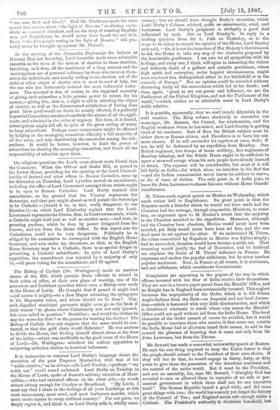On religious questions the Lords seem almost more liberal than
the Commons. When the Offices' and Oaths' Bill, as passed in the Lower House, providing for the opening of the Lord Chancel- lorship of Ireland and other offices to Roman Catholics, came up for discussion on Thursday, Lord Lyveden moved an amendment, including the office of Lord-Lieutenant amongst those which ought to be open to Roman Catholics. Lord Derby resisted this amendment, on the ground that the Viceroy represents the Sovereign, and that you might almost as well permit the Sovereign to be Catholic — (would it be, in fact, really dangerous to our liberties?)—to which Lord Kimberley replied that the Lord- Lieutenant represents the Crown, first, in Court ceremonials, which a Catholic might hold just as well as another man,—and next, in granting pardons, which he does by power delegated from the Crown, and not from the Home Office. In this aspect also his Catholicism could not be very dangerous. Politically he is obliged by his commission to correspond with the English Home Secretary, and acts under his directions, so that, as the English Home Secretary may be a Catholic, there is no special danger in permitting a Catholic subordinate. In spite of Lord Derby's opposition, the amendment was rejected by a majority of only 14,-55 peers voting for the amendment, and 69 against.






























 Previous page
Previous page